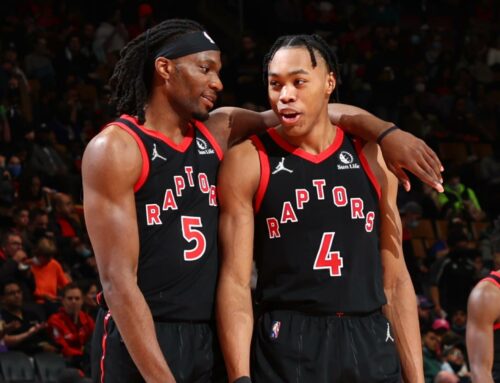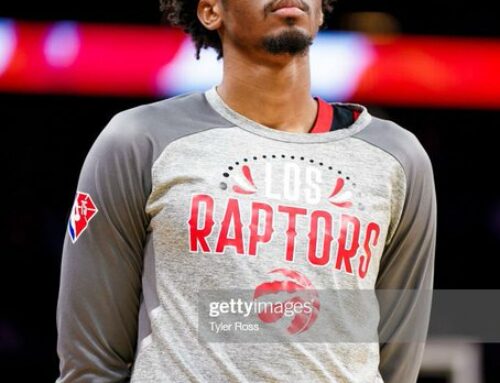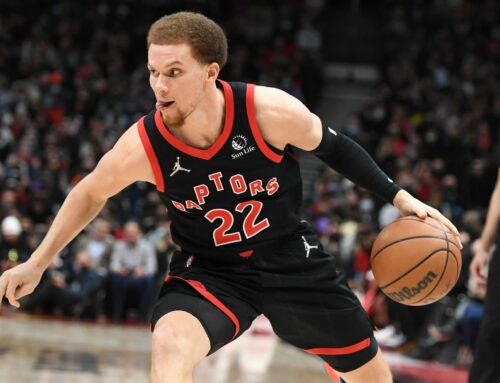Is there ever too much of a good thing?
The whole Goldilocks-Bear Family fracas suggests so.
Pizza Hut’s forever lost my patronage overdoing it with stuffed-crust pizza.
Marie Kondo would be distressed by Troy Weaver’s glee over hoarding big men.
The Brooklyn Nets, on the other hand, certainly don’t think so.
Ironically, at the start of the season, the Nets exemplified balance. Depth at every position. A pecking order. Youth and experience. Naive coach countered by sage assistant. Even a zealous billionaire governor conjoined to a patient journeyman-player-come-General Manager.
Then they trade for James Harden. The Papa Bear’s porridge of NBA acquisitions. A flipped middle-digit to the idea of moderation.
Their defiance has triumphed thus far. Better than imagined – by most of us anyway. James Harden’s arrival – in which he’s transformed into a playmaking, shooting, passing, attacking hydra – has vaulted the Brooklyn Nets to the league’s most efficient offence, per Cleaning the Glass, and the second-best record in the NBA. That’s with Kevin Durant playing in only ten of those twenty-four games and Kyrie Irving missing a handful.
Over-the-top they may be, but there has never been a team with this kind of scoring prowess in the league. Ever. This is the most unprecedented and perilous triumvirate since Caesar, Pompey, and Crassus.
Critics will point to the Nets’ defence – or lack thereof – to suggest that they’ll melt in the playoffs when the games’ pace grinds to a halt. They’re 26th in defensive rating and show no real optimism for improvement.
The Efficiency Landscape at the All-Star Break.
What Jumps Out? pic.twitter.com/goQ7RbnPt8— Kirk Goldsberry (@kirkgoldsberry) March 5, 2021
But, it’s possible that the you-can’t-win-playoff-games-without-defence maxim is in serious contention and means little when you have three of history’s most creative and efficient scorers, and three of this year’s top sixteen of Five Thirty-Eight’s Offensive RAPTOR Score. Besides, I am not so convinced that come playoffs, with a healthy KD, the Nets’ defence won’t conveniently perk up.
So forget the defence argument for a moment. The Nets’ biggest issue moving forward is their bench.
They gutted their roster to get Harden – I still don’t get dumping Jarett Allen, unless it was a gesture to DeAndre Jordan’s insecurities – and, since then, are second-last in points scored and at the bottom part of the league in rebounding, assists, and free-throw attempts.
Durant’s return will rectify some of the bench’s vexations. Head Coach, Steve Nash, will have the over-indulgent luxury of keeping two of Irving, Harden, or Durant on the floor at all times.
To date, though, we’ve seen little permutations of that configuration. They’ve played only eleven games together; the sample sizes are limited.
What we do know is that when one of the three plays alone, the Nets are less potent. All solo-Irving lineups (that have played fifteen minutes or more together) have a negative plus/minus. Only one solo-Harden lineup has a positive plus/minus. And Durant has yet to play without either.
When two of the three play, their success varies. Irving-Harden lineups are at extremes in both directions – the common negative denominator is Jeff Green. There have been only one Durant-Harden and one Durant-Irving lineup that have played more than fifteen minutes together – both of those lineups smoke.
When the duos are in full effect, Jeff Green or Bruce Brown are the extents of their bench rotation. You have to lower the threshold to five total minutes to find any other combination of players. There is evidence of success, but the sample size is paltry.
There is also only one lineup that has played more than five minutes together without any of Durant, Irving, or Harden. They are plus-13, but it was for thirteen minutes in one game.
All that to say, Brooklyn is loath to rely on its bench and, no surprise here, vulnerable to such a tight rotation.
The biggest challenge with their bench is that, after the Three Amigos, there is zero-with-a-capital-Z playmaking.
Losing Dinwiddie for the year was crushing. He is EXACTLY the kind of scoring zest they need. Jeff Green has his oh-now-he’s-turned-the-corner moments every one of eight games, only to then fade into complete obscurity for the remainder. And that’s it. Everyone else depends on some form of preceding creation to get their buckets.
Thus, the importance of Blake Griffin. He could be – coulddd be – that oomph the Nets’ offence needs when not historically diabolical.
The problem is Brooklyn doesn’t know which Blake Griffin they are going to get. I can confidently confirm that they’re not getting the can-of-spinach BG who used to soar in the air, freeze time, and either pass the ball ten minutes later or cram it like a Macho Man Randy Savage flying-elbow from the top rope. But I don’t think they’re expecting that either.
It’s, generally, hard to know the value of a retrograding veteran on a crud team. Sometimes they’re totally busted. Other times you have this sneaking suspicion that they’re actually saving themselves as one does on a jog just so they can sprint at the end and feel like they’ve been running fast the entire time (I may or may not know from experience). Nicholas Batum may also know this phenomenon too.
Blake Griffin should do a prank for his show where he looks washed for months then gets a buyout and signs with the most talented team in the league and suddenly starts playing like he’s 25 again.
— Jared Weiss (@JaredWeissNBA) March 8, 2021
It’s even harder to say with Blake specifically. For the past year and a half, he’s been injured or recovering from an injury. Blake has had more injuries over the course of his career than probably six careers put together. They’ve taken their toll.
He played twenty of twenty-six games this year, but, in the middle of February, he and the Detroit Pistons agreed to see other people while staying friends.
When Blake was playing, prior to their platonic arrangements, his game was lackluster. Everything across the board was down: his shooting percentages, his points scored, his usage, his box plus/minus, his win shares.
Watching Blake confirms the numbers. He’s not one to move all that much anymore. Seeing him start to run is like watching my seventy-two-year-old Dad struggle to get off the couch. Blake lets transitions go-on without him like he’s resignedly releasing his pet deer back into the woods. And, on some possessions, after scores, he inbounds the ball and isn’t seen again until the shot clock reads 18.
Once he gets to the offensive end, Blake seldom moves. He avoids cutting or attacking from the perimeter – his name is not even in the NBA.com/stats tracking database for cuts. Two years ago he averaged eight drives per game; last year six; this year two. Fifty percent of his possessions are either spotting-up or posting up. He’s even screening less than he used to. All effects of a stubborn body.
To be fair, this has been a small sample size on a team that sucks. He’s played a grand total of thirty-eight games in two seasons in an uninspiring situation.
Twas only two years ago – the 2018-19 season – when he played seventy-five games, averaged twenty-five points, eight rebounds, and five assists, made third-team All NBA, and led his team into the playoffs.
So, there’s a chance – I am saying there’s a chance – we see a facsimile of a facsimile of that Blake. There’s also a larger chance we see some version of the recently plodding Blake.
But I am willing to say that, whichever manifestation appears, that Blake is going to augment Brooklyn’s hobbled bench. Especially if he’s playing alongside one of the three big boys. (Defence is not happening – but, remember, Brooklyn doesn’t care that it’s not happening).
Let’s assume Faux-2018 Blake is less likely; 2021 Blake can still use his intelligence, size, and shooting to centralize and balance their offence. There’s a precedent for adding on this type of complementary, creative forward. James Edwards of The Athletic aptly compared the BG signing to the San Antonio Spurs’ signing of a late-stage Boris Diaw – who also seemed dead-in-the-water.
Blake’s less elastic than Diaw. He’s perhaps more of a blend of Diaw and the Golden State Warriors version of David West. A bruising, passing, shooting big off the bench that can flavour the offence in a multitude of ways.
He can fill Brooklyn’s parking-lot-sized void of a passing big man: operating at the elbow and perimeter running dribble-hand-offs with Landry Shamet a la Duncan Robinson-Bam Adebayo; generating those four-on-three attacks that Steph Curry and Draymond Green so mercilessly utilize; and, exploiting the two-on-two pick-your-poison Jamal Murray and Nikola Jokić like to use – as outlined by Nekias Duncan of Basketball News.
Blake can go high-low with his old pal DeAndre, and with KD, and work those post-to-post screens sometimes used by Ben Simmons and Joel Embiid.
On his own, he can use what remaining juice he has left to attack slower bigs. Even in his state, he moves analogously to Chris Paul or Kyle Lowry, leveraging his ass and old-man strength to get around and immobilize his defenders.
Or he can use his soft touch, massive girth, and guard-like footwork to battle down low where Brooklyn seldom ventures – they’re in the bottom of the league in points in the paint.
At the very, very least, Blake can go full Kevin Love and just spot-up for three. He’s shot 35% on catch and shoot threes so far this year.
Perhaps not in the playoffs as much, but one lineup I envision in the second half of the season is some arrangement of Blake, Harden/Irving, Shamet/ Harris, Nicholas Claxton, and Timothé Luwawu-Cabarrot.
Brooklyn can rely on the balance of a dependable creator, two reliable shooters, a bouncy athletic big to manage the paint and the rebounding, and Blake to provide secondary playmaking and additional shooting. That’s all that’s required and that’s all Blake needs to do to make his presence felt.
Perhaps Blake has not been given enough credit for his adaptability over his career because he’s failed the minds of many as a superstar. But throughout, he’s played with teams improperly built for his talents. He’s paired with ball-dominant guards and space-suffocating bigs. In Brooklyn, he’ll thrive in their space.
Brooklyn is taking too much of a good thing to the extreme. They’ve tasted the forbidden fruit and they’re going back for thirds. And I can’t say I blame them. It’s worked so far, and there’s no turning back now.
*Also published on www.raptorsrepublic.com





